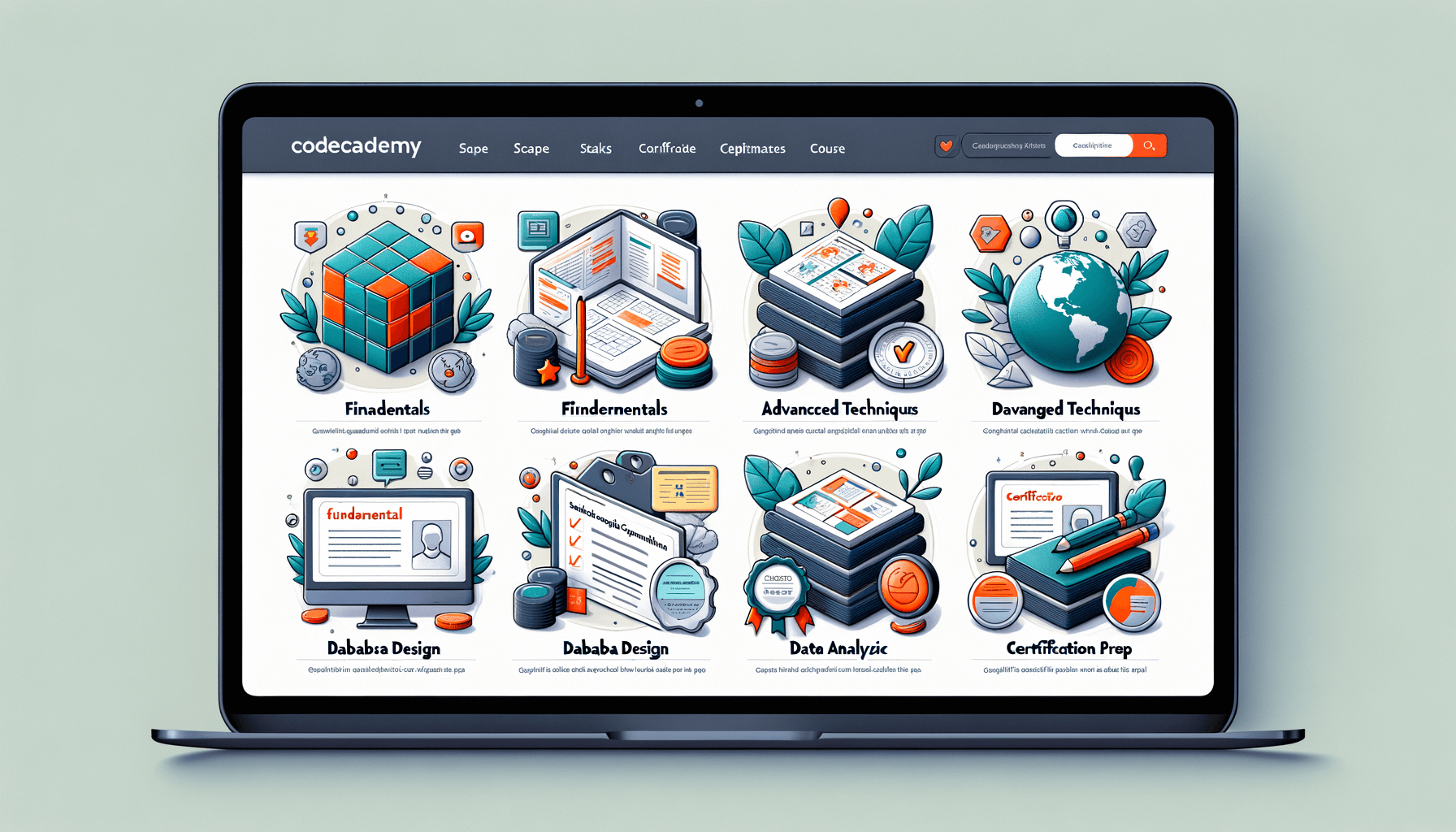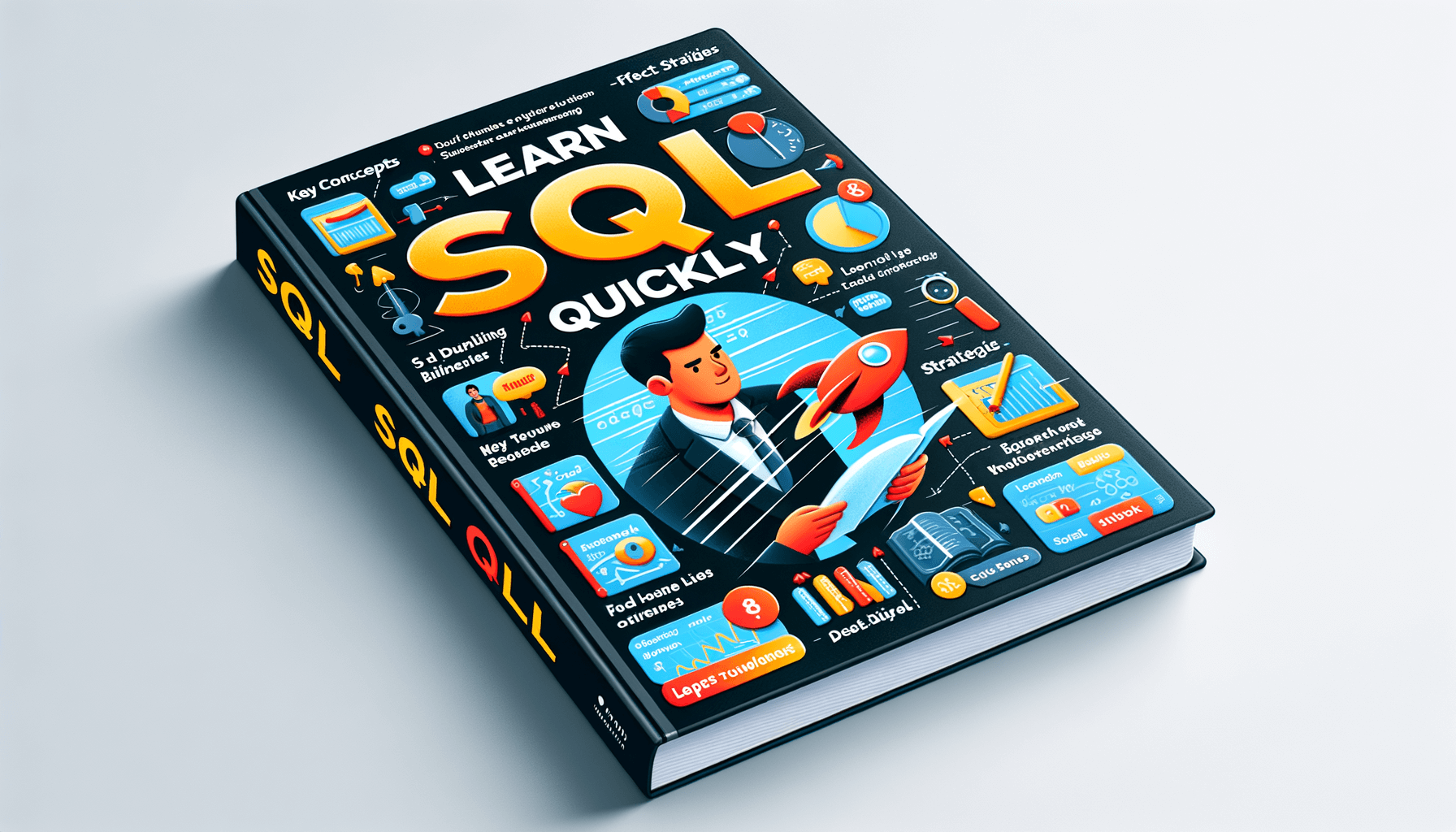A big variety of articles and resources

Master SQL with Codecademy's Comprehensive Course
 Sia Author and Instructor
Learn SQL
Sia Author and Instructor
Learn SQL
10 minute read
Learning SQL can open many doors in the world of data. Codecademy's detailed course on SQL helps you understand the basics and advanced topics. Whether you're new to SQL or want to improve your skills, this course has something for everyone.
Key Takeaways
- Learn the basics of SQL, including syntax and simple queries.
- Understand advanced SQL topics like joins, subqueries, and window functions.
- Get to know how to design databases and use normalization techniques.
- See how SQL is used in real-world data analysis and business intelligence.
- Learn how to optimize your SQL queries for better performance.
Understanding the Fundamentals of SQL
Introduction to SQL Syntax
In this section, we dive into the basics of SQL syntax. SQL, or Structured Query Language, is the standard language for interacting with databases. Learning SQL is essential for anyone looking to work with data. We will cover the basic structure of SQL statements, including SELECT, INSERT, UPDATE, and DELETE commands. Understanding these commands is the first step to mastering SQL.
Basic SQL Queries
Here, we explore how to write simple SQL queries to retrieve data from a database. We will discuss the SELECT statement in detail, along with WHERE clauses to filter data. By the end of this section, you will be able to write queries to fetch specific data from any database.
Data Types and Operators
In this part, we look at the different data types available in SQL and how to use operators to manipulate data. From integers to strings, knowing the right data type is crucial for efficient database management. We will also cover arithmetic and logical operators, which are essential for performing calculations and making decisions within your queries.
Mastering the fundamentals of SQL is the foundation for advanced database management and data analysis. With a solid understanding of these basics, you can confidently move on to more complex topics.
Advanced SQL Techniques and Functions
Complex Joins and Subqueries
In this section, we dive into the world of complex joins and subqueries. These techniques allow us to combine data from multiple tables in sophisticated ways. Mastering these skills will enable us to solve intricate data problems and enhance our SQL capabilities.
Window Functions
Window functions are powerful tools that let us perform calculations across a set of table rows related to the current row. They are essential for tasks like running totals, moving averages, and ranking. By learning window functions, we can gain a competitive edge in business intelligence.
Stored Procedures and Triggers
Stored procedures and triggers are advanced SQL features that help automate tasks and enforce business rules. Stored procedures are precompiled collections of SQL statements that can be executed as a single unit, while triggers automatically execute in response to certain events on a table. These tools are crucial for maintaining data integrity and streamlining database operations.
Enhancing our SQL skills with advanced functions and sorting techniques will give us practical skills enhancement through real-world problems and AI assistance.
Database Design and Normalization
Principles of Database Design
When we start designing a database, we need to think about how the data will be used. This helps us create a structure that is both efficient and easy to understand. Good database design ensures that data is stored in a way that reduces redundancy and improves data integrity. We should always aim to create tables that are related in a meaningful way, which is crucial for effective database relationship management.
Normalization Techniques
Normalization is a process that helps us organize the data in our database. By following normalization rules, we can make sure that our data is consistent and free of unnecessary duplication. The main goal is to divide large tables into smaller ones and define relationships between them. This not only makes the database more efficient but also helps in maintaining data integrity.
Entity-Relationship Modeling
Entity-Relationship (ER) modeling is a way to visually represent the structure of a database. It helps us understand how different pieces of data are connected. In an ER model, entities represent real-world objects, and relationships show how these entities interact with each other. This is a crucial step in schema optimization, as it allows us to plan out the database before we start building it.
By mastering these concepts, we can create databases that are both efficient and easy to manage. This foundation is essential for anyone looking to gain expertise in database design and management.
Practical Applications of SQL in Data Analysis
Data Extraction and Transformation
In our course, we dive into how SQL can be used to extract and transform data from various sources. SQL is a powerful tool for pulling data from databases and reshaping it to fit your needs. We cover techniques like filtering, sorting, and joining tables to create meaningful datasets.
Aggregating and Summarizing Data
We also explore how to use SQL for aggregating and summarizing data. This includes learning functions like COUNT, SUM, AVG, and GROUP BY to get insights from large datasets. These skills are essential for anyone looking to analyze data effectively.
Using SQL for Business Intelligence
Finally, we discuss how SQL is used in business intelligence. This involves creating reports and dashboards that help businesses make informed decisions. We show you how to write queries that provide real-time data and how to visualize this data for stakeholders.
Mastering these SQL techniques will give you a strong foundation in data analysis, making you a valuable asset in any data-driven organization.
Optimizing SQL Performance
Indexing Strategies
When we talk about speeding up SQL queries, indexing is a key strategy. Indexes help the database find data faster, much like an index in a book. Creating the right indexes can make a huge difference in how quickly your queries run. However, too many indexes can slow down data insertion and updates. It's all about finding the right balance.
Query Optimization Techniques
Optimizing queries involves writing them in a way that the database can execute them as efficiently as possible. This might mean breaking down complex queries into simpler ones or using joins instead of subqueries. In our sqlmicro course, we cover various techniques to help you write better queries. Remember, even small changes can lead to big improvements in performance.
Understanding Execution Plans
Execution plans show how the database engine executes a query. By examining these plans, we can identify bottlenecks and areas for improvement. Tools like SQL Server Management Studio provide detailed execution plans that can guide us in optimizing our queries. Understanding these plans is crucial for anyone looking to specialize in performance optimization.
Performance tuning is not just about making queries run faster; it's about making the entire database system more efficient. This involves a mix of good design, proper indexing, and smart query writing.
Hands-On Projects and Real-World Scenarios
Building a Sample Database
In this section, we will guide you through the process of building a sample database from scratch. This project will help you understand the fundamentals of database creation, including defining tables, setting primary keys, and establishing relationships between tables. By the end of this project, you will have a fully functional database that you can use for further practice and experimentation.
Creating Interactive Reports
Creating interactive reports is a crucial skill for any data professional. We will show you how to use SQL to generate dynamic reports that can be easily updated and customized. This will involve writing complex queries, using aggregate functions, and presenting data in a user-friendly format. Interactive reports are essential for making data-driven decisions and communicating insights effectively.
Case Studies and Practical Exercises
To solidify your understanding, we will provide case studies and practical exercises that mimic real-world scenarios. These exercises will challenge you to apply your SQL knowledge to solve problems, analyze data, and generate meaningful insights. This hands-on approach ensures that you are well-prepared for any SQL-related tasks you may encounter in your career.
Engaging in these hands-on projects and real-world scenarios will not only enhance your SQL skills but also boost your confidence in handling complex data tasks.
Preparing for SQL Certification Exams
Exam Structure and Content
When preparing for SQL certification exams, it's crucial to understand the exam structure and content. These exams typically cover a range of topics from basic SQL queries to advanced database management techniques. Knowing what to expect can help you focus your study efforts more effectively.
Study Tips and Resources
To excel in your certification exam, we recommend using a variety of study resources. These can include textbooks, online courses, and practice exams. One excellent resource is the Zero to PostgreSQL Junior DBA course, which offers practical SQL training with real-world problems, personalized support, and industry insights. The instructor, Eric Vanier, has over 25 years of expertise in database management.
Practice Tests and Assessments
Taking practice tests is a great way to gauge your readiness for the actual exam. These tests can help you identify areas where you need further study. Additionally, assessments can provide a simulated exam environment, helping you get comfortable with the format and timing of the real test.
Consistent practice and thorough understanding of the material are key to passing your SQL certification exams on the first try.
Getting ready for your SQL certification exams can be a big task, but we're here to help! Our website offers a range of courses designed to boost your skills and confidence. Whether you're just starting out or looking to refine your knowledge, we have something for everyone. Don't wait—visit us today and start your journey to becoming a SQL expert!
Conclusion
Codecademy's SQL course offers a thorough and easy-to-follow guide for anyone looking to master SQL. The course covers all the essential topics, from basic queries to advanced database management. With interactive lessons and hands-on projects, learners can practice and apply their skills in real-world scenarios. By the end of the course, students will have a solid understanding of SQL and be well-prepared to use it in various applications. Whether you're a beginner or looking to refresh your skills, Codecademy's SQL course is a valuable resource for achieving your learning goals.
Frequently Asked Questions
What is SQL and why should I learn it?
SQL stands for Structured Query Language. It's used to manage and manipulate databases. Learning SQL is important because it's a key skill for many jobs, including data analysis, web development, and database administration.
Do I need any prior knowledge before taking Codecademy's SQL course?
No, you don't need any prior knowledge. Codecademy's course starts with the basics and gradually moves to more advanced topics. It's designed for beginners.
How long will it take to complete the SQL course?
The time it takes to finish the course depends on your pace. Some people complete it in a few weeks, while others might take a few months. You can learn at your own speed.
What kind of projects will I work on in the course?
You'll work on various projects, like building a sample database and creating interactive reports. These projects help you apply what you've learned in real-world scenarios.
Will this course prepare me for SQL certification exams?
Yes, the course covers topics that are often included in SQL certification exams. It also offers study tips and practice tests to help you prepare.
Can I use SQL for business purposes?
Absolutely! SQL is widely used in business for tasks like data analysis, reporting, and managing databases. The skills you learn in this course can be applied in many business settings.
Related Articles

Harnessing SQL for Machine Learning: A Comprehensive Guide
11 minute read

How Fast Can You Learn SQL? Tips for Rapid Mastery
8 minute read

Is it worth learning SQL in 2021-2022?
14 minute read




